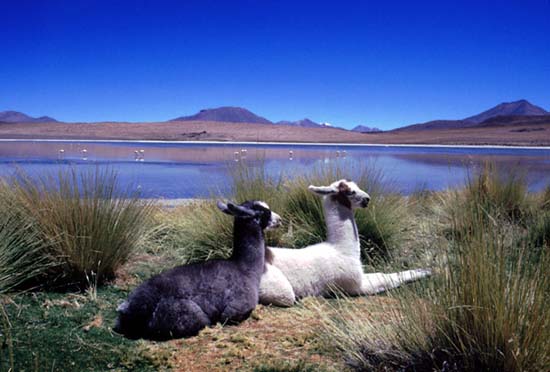
Bolivia RPCV Amy Potter writes the Insider's Guide to The Peace Corps
Insider's Guide to The Peace Corps
If you think you're ready to sign on for two years in a foreign country, make a decision with your eyes wide open.
by Amy Potter
I decided to join the Peace Corps after graduating from college in 1996. After a tedious application process and many, many visits to the doctor's office, I was accepted as a Community Agriculture Volunteer in South America. During my first two years of Peace Corps service, I lived in the rural town of Melga, Bolivia, an agricultural community located in the Andes and populated by native Quechuan Indians.
My first assignment was to teach organic farming techniques to local farmers. It didn't take me long to realize that I was not going to single-handedly convince the Quechans to abandon the potato as the staple of their diet. After much frustration, I created a new assignment for myself, working with the women of the tribe to discuss health and gender issues.
This was more rewarding, but, being stubborn by nature, I still didn't feel that I had had a "typical" Peace Corps experience. Although the average Peace Corps stint lasts two years, I signed on for an additional tour of duty, spending a total of four years in various parts of Bolivia.
During my service, I learned a few important things about development work and helping people. Here are just a few things to be aware of before joining the Peace Corps:
* The American concept of work is very different from the rest of the world. Here in the United States, we seem to believe that the busier we are, the more important, popular, and successful we are. If you are not willing to completely change your entire view on work, do not join the Peace Corps. No matter what your project, your primary responsibility is to remain open to the culture and develop friendships with people in your community. This will impact everyone far more than any latrine you build.
* Conditions will be harsh, and even dangerous. Be assured: you will be sick at one time or another. Physical characteristics of your bodily waste will become topics of dinner conversation. Rabies, malaria and typhoid are all usually prevalent in most countries where volunteers serve. Did I mention the political unrest? The list goes on and on.
* The local traditional diet can be great. It can also be extremely questionable. And you will probably eat and drink that extremely questionable stuff. I, for example, used to be a vegetarian. I now crave this thing called "anticucho," otherwise known as "cow heart on a stick". But the thing is, it's not always cow heart. Sometimes it's cow liver, sometimes it's chicken heart, and sometimes I really didn't want to know. But God was it good! It was served on a skewer, hot off the coals, with a boiled potato and peanut sauce. Bolivia also has a local drink called chicha. Some describe it as corn beer. I describe it as some thick yellow fluid that tastes like bile. It's awful. And I love it.
* As U.S. citizens, we can do very little to help people. The most important thing Peace Corps volunteers can do is to offer respect to those we meet. We can inform people in other cultures of their options in life, but they are the ones that will ultimately help themselves.
If you're interested in applying for the Peace Corps, here are the steps you'll need to follow:
* Visit their website, or call 1-800-424-858
* You'll need to be a U.S. citizen to qualify.
* Once you've filled out an application for Peace Corps, your recruiter will call you for an interview. If accepted, your recruiter will match you with an assignment and a country, which you can accept or decline.
This is an important point, one I'd like to illustrate with a story. My Bolivian friend, Janeth, was 20 years old when she had her baby, Kevin. The baby's father refused to recognize that Kevin was his child, and Janeth came to me for advice on her legal rights. I knew very little about Bolivian laws, but I told her that I would find out. After researching the options available, I suggested she make an appointment with a local office dedicated to promoting women's legal rights.
For months, we went to meetings together and worked to have Kevin recognized by his father. Eventually, Janeth started to go to meetings by herself and took complete charge of the situation. Finally, the courts, and the father, officially recognized the child, which meant that Kevin would receive economic support and a second last name. (In Latino culture, if a father does not recognize a child as his, the child has only one last name, causing social as well as potential work problems for the child throughout life). The most important success, however, was that Janeth felt empowered -- no small feat for a woman with an 8th grade education who grew up in total poverty.
Helping Janeth was the one thing that I did during my four years in Bolivia that was truly worth something. I let Janeth know about her options and went to a few meetings with her. That was all. But that very simple action was worth more than the school garden program I instituted, the latrines I built or the nutrition classes I gave.
I feel great about my time in Peace Corps. I don't regret a minute. I had some of the worst moments of my life in Bolivia, but also some of the best.
